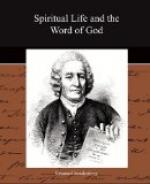He that abstains from adulteries from any other motive than because they are sins and are against God is still an adulterer; as for instance when anyone abstains from them from fear of the civil law and its penalties, from fear of the loss of reputation and thus of honor, from fear of resulting diseases, from fear of upbraidings at home from his wife and consequent intranquility of life, from fear of chastisement by the servants of the injured husband, from poverty, or from avarice; from infirmity arising from abuse or from age or impotence or disease; in fact, when one abstains because of any natural or moral law, and does not at the same time abstain because of the Divine law, he is interiorly unchaste and an adulterer, since he none the less believes that adulteries are not sins, and therefore declares them lawful in his spirit, and thus commits them in spirit, although not in the body; consequently after death when he becomes a spirit he speaks openly in favor of them, and commits them without shame.
It has been granted me in the spiritual world to see maidens who regarded whoredoms as wicked because they are contrary to the Divine law, and also maidens who did not regard them as wicked and yet abstained from them because the resulting bad name would turn away suitors. These latter I saw encompassed with a dusky cloud in their descent to those below, while the former I saw encompassed with a shining light in their ascent to those above. (A.E., n. 1009.)
VII. The Seventh Commandment
In what now follows something shall be said about the seventh commandment, which is, “Thou shalt not kill.” In all the commandments of the Decalogue, as in all things of the Word, two internal senses are involved (besides the highest which is a third), one that is next to the letter and is called the spiritual moral sense, another that is more remote and is called the spiritual celestial sense.
The nearest sense of this commandment, “Thou shalt not kill,” which is the spiritual moral sense, is that one must not hate his brother or neighbor, and thus not defame or slander him; for thus he would injure or kill his reputation and honor, which is the source of his life among his brethren, which is called his civil life, and afterward he would live in society as one dead, for he would be numbered among the vile and wicked, with whom no one would associate. When this is done from enmity, from hatred, or from revenge, it is murder.
Morever, by many in the world this life is counted and esteemed in equal measure with the life of the body. And before the angels in the heavens he that destroys this life is held to be as guilty as if he had destroyed the bodily life of his brother. For enmity, hatred, and revenge breathe murder and will it; but they are restrained and curbed by fear of the law, of resistance and of loss of reputation. And yet these three are endeavors toward murder; and every endeavor is an act, for it goes forth into act when fear is removed. This is what the Lord teaches in Matthew:




